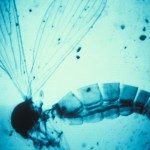Lien vers Pubmed [PMID] – 35767561
Lien DOI – 10.1371/journal.pbio.3001715
PLoS Biol 2022 Jun; 20(6): e3001715
The origin of RNA interference (RNAi) is usually explained by a defense-based hypothesis, in which RNAi evolved as a defense against transposable elements (TEs) and RNA viruses and was already present in the last eukaryotic common ancestor (LECA). However, since RNA antisense regulation and double-stranded RNAs (dsRNAs) are ancient and widespread phenomena, the origin of defensive RNAi should have occurred in parallel with its regulative functions to avoid imbalances in gene regulation. Thus, we propose a neutral evolutionary hypothesis for the origin of RNAi in which qualitative system drift from a prokaryotic antisense RNA (asRNA) gene regulation mechanism leads to the formation of RNAi through constructive neutral evolution (CNE). We argue that RNAi was already present in the ancestor of LECA before the need for a new defense system arose and that its presence helped to shape eukaryotic genomic architecture and stability.

